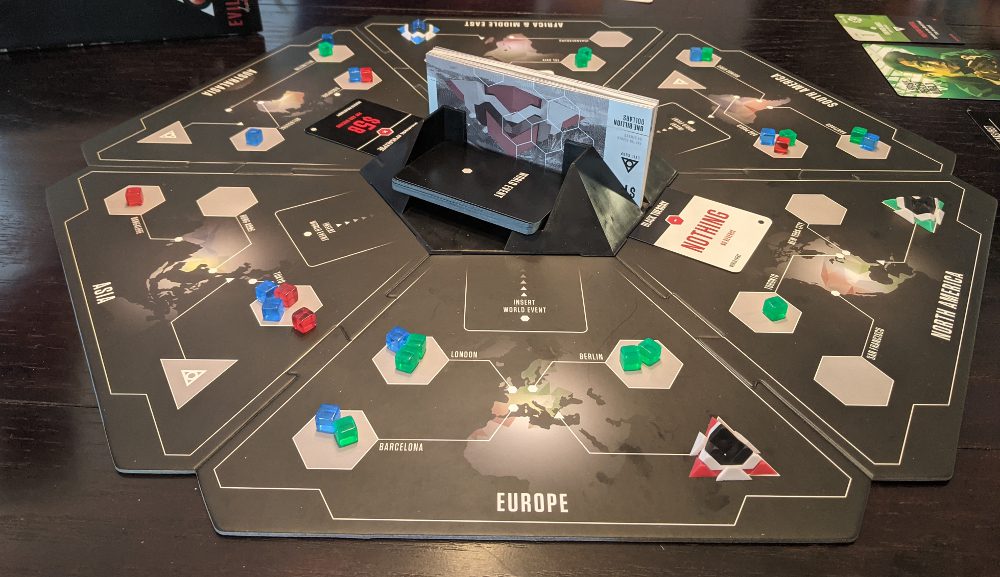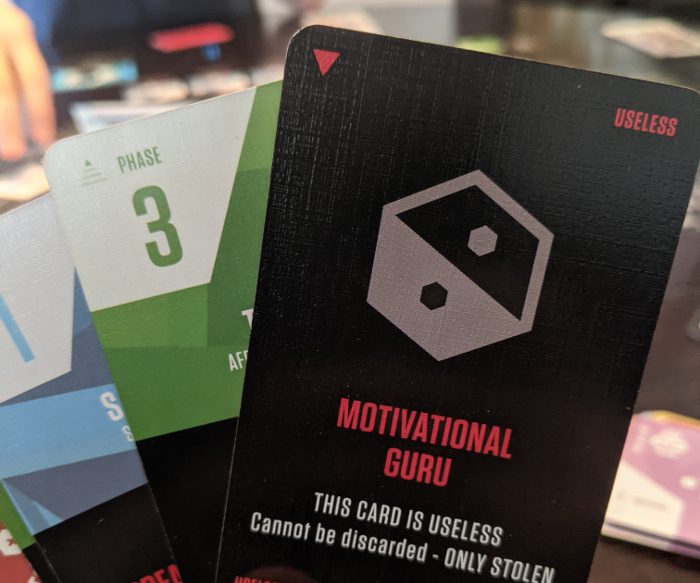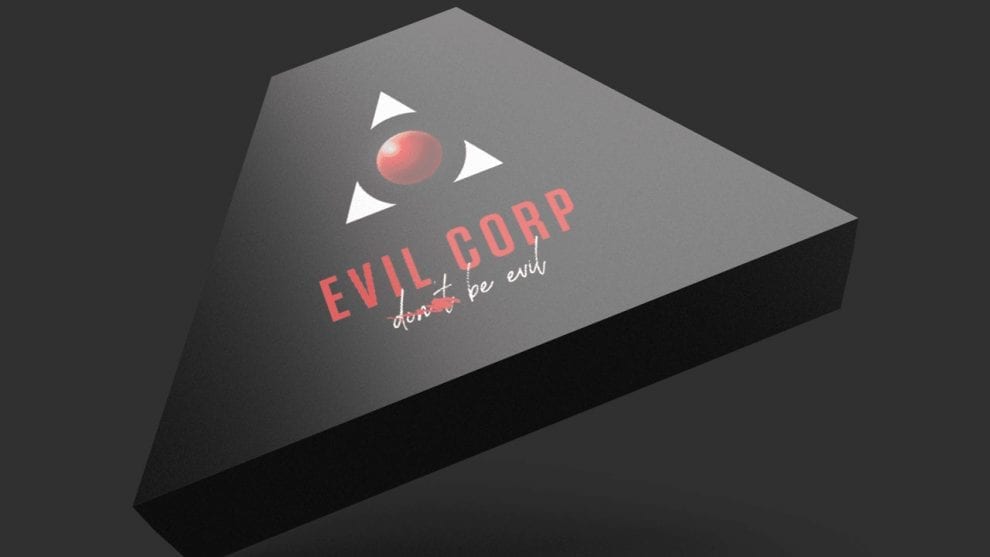Disclosure: Meeple Mountain received a free copy of this product in exchange for an honest, unbiased review. This review is not intended to be an endorsement.
Evil Corp. That name is as subtle as a broken window. There are six corps here, each specializing in a particular tech, and they have their own end goals that are “not human friendly.” Sounds bad, right? Maybe to normal people, but you’re the CEO here and you’re leading this charge to technological genocide.
To help you on this journey of mass destruction, you have a few billion dollars and a hand of opportunity cards. The board itself has six “markets” like North America, Africa, and continents. Each market has three cities, and you will place down three cubes representing your “businesses” in any three cities of your choosing. You also get an upgradable HQ spot that the rulebook states is your Tax Haven / Volcanic Island.
It’s Just A Phase
Each turn goes through a three phase affair. You collect your cash, play some cards, and stick a World Event card in one of the six markets. Seems easy so far.
The “Collect Phase” has two steps. First, you need to calculate your revenue, and you have to announce how much you earn. To keep things simple, you count your businesses, your headquarters, and World Event cards. After the fun math time, you draw some Opportunity cards up to your hand limit.
You might ask yourself, “Why should I announce my revenue?” Audits. At any point during the game, a player can declare an audit on someone else. It is a claim that a player violated a rule, like miscalculating their revenue. Auditing doesn’t always involve money, as players can also call audits for other rule violations such as going over the hand limit or placing their businesses incorrectly. If it’s the right call, they get two billion dollars from the accused player, and the reverse happens if it was incorrect.
There are some funny rules out there in board games, and this is one of the top. If you park a stack of paper money in any game, there will always be one player who wants to collect more than the others through creative math or sleight of hand. For a designer to embrace this and gamify it by rewarding players for scrutinizing others is hilarious.

Playing The Keynesian Model
After collecting your dough and dodging accusations, it’s now time to expand your empire during the Spend phase.
We can start with the Opportunity cards in your hand. Most Opportunity cards have two halves, and when you play them, you must pick which half to use. On the top half you spend money to place down a business. The catch here is the Phase numbers you see on the corner. You must play them in a sequence, so you cannot play Phase 3 without playing Phase 1 or Phase 2. You can also play a Phase number you already have, it just replaces the old card, but you still keep the business.
The bottom half is the Nasty Business. There is no financial cost to play this card, and you simply follow the text and discard it. Most of them harm the other players, so yes, it is a “Take That” mechanism.
Screwing Your Friends Right
Although I may not be a fan of this idea, I must admit that Evil Corp implements “Take That” more intelligently than most other games I have played. Using a Nasty Business portion of these cards means sacrificing future revenue, throwing in an enormous opportunity cost that you must factor in. There is also the matter of the effects themselves. Compared to other “Take That” games, Nasty Business cards feel more like a scratch that heals over time instead of cutting your arm off.
Not all Opportunity cards are about expanding businesses or disrupting your friends, though. Some of them negate Nasty Business, while others are hilarious parodies of the industry with a very annoying effect. The most notable cards are the Agency cards. These cards represent the various governmental branches, and they have a menu of effects you can take like going through the Discard pile to grab a card. If an Agency Card goes into the discard pile, you shuffle the discard pile back into the deck, eliminating card counting and keeping the forward momentum.
Besides playing cards, you can also perform a Hostile Takeover. If any player has a business card in front of them with your color, you can buy that card from them to add it to your hand. You must have all three Phase cards in front of you in your color to trigger the endgame, so this is a way for you to speed up the process by paying a hefty premium.
Once you’ve played your cards and did some takeovers, it’s time for World Events. Draw a card, read its flavorful text, and acknowledge its effects. You will then roll a die that will tell you which Market that card will slot into. Market Cards alter the revenue of a particular market, so anyone with a business in that market must deal with its effects.
Ending It All With A Bang Or Three
So, that was a turn, but what about the endgame? I have already stated that you need three Phase cards of your color to activate it, but that is only part of it. Once you have all three cards, you can spend 9 billion dollars to attempt to end the game instead of taking your normal turn. Each player can play an agency card to stop you, and you can respond with an agency card of your own. If no one has any agency cards to stop you, you dominate the world. Congratulations, I think.
I have to admit that I am surprised by this one. In any other scenario, I would avoid games with “Take That” elements since there isn’t much thought on playing optimally. While some of that issue exists here, Evil Corp is one of the few games in this area swimming in modern design sensibilities. Every line in the rulebook, and how it plays out, makes sense.
It isn’t the heavy entry that many modern games get accustomed to though. The rules play more of a backdrop and it’s the social engagement that lubricates this entire experience. Audits, Nasty Business, and Business placements each give players a reason to emotionally connect. The story may not be mechanically interesting, but it will keep you engaged from start to finish.
Especially if the story being told is important.

It Wasn’t Just A Clickbait Title
Much like The Landlord’s Game (which is now Monopoly), Evil Corp has a message to send if you squint at the details. Whereas The Landlord’s Game warned the players about the dangers of private land ownership in the hands of the few, Evil Corp wants you to acknowledge the threat of unmonitored technological capitalist growth, much like Techlandia.
One of the early signs that something is amiss are the six CEOs. Besides sporting some beautiful artwork, all of them have a quote at the back announcing their end game plan. Red wants to go to Mars, and a little bird told me the Blue CEO wants to use social media to create their hive mind. These are distinct references to certain modern companies that we have today.
Luckily, there’s more to it than cute references, and the mechanisms lend their hand to develop a story that’s as traditional as an American hating their neighbor.
A good start to examine all of this will be at the very beginning of your turn. When you collect your money, you calculate your businesses and take world event cards into consideration. Your first few turns are simple, and yet the complexity creeps up as you expand your businesses to more markets with world event cards all over the place. It becomes tedious to calculate everything, and that’s by design because accounting itself is tedious. It wants you to trip so that your opponents will call you out with a simple yell of the word “Audit.”
Numbers Can Be Fun
Auditing itself is also the perfect mechanism to communicate the challenges of running a large corporation, evil or not. When publishing the numbers, every short seller, government official, and skeptical investors sharpen their knives as they cut through the pages hoping to find a problem. It’s a brilliant feeling when you announce your number, and your friends can only respond with swear words barely escaping their lips.
In addition, the audit can expose cheaters, and I have never encountered a more meta-rule in a board game. For a moment, picture yourself as the CEO of a corporation whose goal is to mess up humanity. Why on earth would you follow the rules? You’re the jerk in this game, and it’s allowing you to bend the rules as long as you are not caught, which is just as appealing as pressing every elevator button before you leave.
In a game centered on a theme, even the Nasty Business cards work. Indeed, playing cards that hurt the leader may not be intellectually engaging, but if you consider the businesses of today, it makes complete sense. One glance at Elon Musk reveals everything you need to know. Did you know about Elon Musk 15 years ago? I will bet most of you reading this didn’t. It was only when his company Tesla skyrocketed itself to the spotlight that we learned more about him. We now have stories about his personality behind the PR curtains, the dangerous working conditions, or questionable “business deals” that he likes to boast about. The bigger the rug, the more dirt you can find under it.
Ending the game is another significant factor in Evil Corp telling its story. To end the world, it is necessary to build businesses all over the globe. Over time, these glass office buildings will transmogrify from hives of white-collar workers to monuments announcing your never-ending conquest. With your revenues so high, you can spread further and faster than ever before, or you can try to attain your desired end game multiple times before finally succeeding. The end of the world ceases to be a possibility, it becomes inevitable.

More Social Than Social Media
Even though Evil Corp is a fantastic game, I want to emphasize that it is not a dense experience. If names like Reiner Knizia or Uwe Rosenberg make you lick your lips, Evil Corp will likely annoy you. And if you are not familiar with those names, enjoy the new algorithm ads for the next few weeks.
I view Evil Corp as a social game that just happens to have rules. It wants you to focus your attention on your friends instead of the game itself. My best comparison would be Diplomacy, except I wouldn’t play this with over four people since downtime would be an issue for a game with straightforward decisions.
However, even with that, this game seized my attention. “Take That” features are not my favorite, but here I am looking forward to playing my next Evil Corp game and talking about it to others. It is a game with a noteworthy message underneath its simple rules. Even though it is not the first out there to do this, it is one of the few games I can introduce to non-gamers, which is a valuable thing in this industry.
Check out Tyler’s video review of Evil Corp for another take.











Add Comment